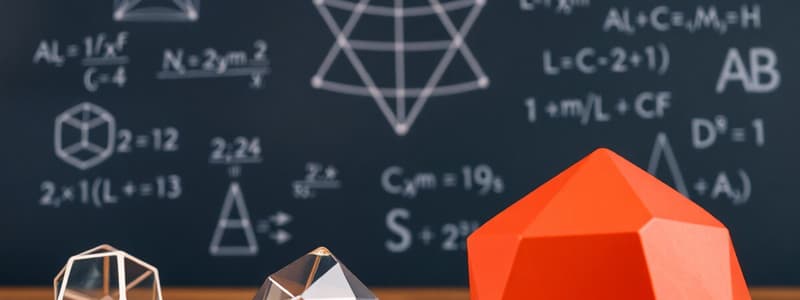Podcast
Questions and Answers
Which of the following branches of mathematics is primarily concerned with the study of shapes and their properties?
Which of the following branches of mathematics is primarily concerned with the study of shapes and their properties?
- Algebra
- Geometry (correct)
- Statistics
- Calculus
What is the primary focus of trigonometry?
What is the primary focus of trigonometry?
- Algebraic equations
- Properties of integers
- Angles and their relationships (correct)
- Statistical data analysis
Which of the following properties applies to addition and multiplication in arithmetic?
Which of the following properties applies to addition and multiplication in arithmetic?
- Associative only
- Commutative and Associative (correct)
- Distributive only
- Commutative only
What does a prime number represent?
What does a prime number represent?
Which mathematical branch focuses on counting and discrete structures?
Which mathematical branch focuses on counting and discrete structures?
Which of the following terms refers to a mathematical statement asserting equality?
Which of the following terms refers to a mathematical statement asserting equality?
What is the definition of a polynomial in mathematics?
What is the definition of a polynomial in mathematics?
Which theorem states that every integer greater than 1 can be factored uniquely into prime numbers?
Which theorem states that every integer greater than 1 can be factored uniquely into prime numbers?
Flashcards are hidden until you start studying
Study Notes
Overview of Mathematics
- Definition: The study of numbers, quantities, shapes, and patterns.
- Branches:
- Arithmetic
- Algebra
- Geometry
- Trigonometry
- Calculus
- Statistics
- Discrete Mathematics
- Linear Algebra
Key Concepts
-
Arithmetic:
- Operations: Addition, Subtraction, Multiplication, Division
- Properties: Commutative, Associative, Distributive
-
Algebra:
- Variables: Symbols representing numbers
- Expressions: Combinations of variables and constants
- Equations: Mathematical statements asserting equality
-
Geometry:
- Shapes: Circles, triangles, squares, polygons
- Properties: Area, perimeter, volume
- Theorems: Pythagorean theorem, congruence, similarity
-
Trigonometry:
- Focus: Relationships between angles and sides of triangles
- Functions: Sine, Cosine, Tangent
- Applications: Wave functions, oscillations
-
Calculus:
- Concepts: Limits, derivatives, integrals
- Applications: Motion, area under curves, optimization
- Branches: Differential calculus, integral calculus
-
Statistics:
- Data Analysis: Mean, median, mode, range
- Probability: Likelihood of events occurring
- Distributions: Normal distribution, binomial distribution
-
Discrete Mathematics:
- Study of countable, distinct mathematical structures
- Topics: Graph theory, combinatorics, algorithms
-
Linear Algebra:
- Focus: Vector spaces and linear mappings
- Key Concepts: Matrices, determinants, eigenvalues
Basic Mathematical Terms
- Prime Number: A natural number greater than 1 that cannot be formed by multiplying two smaller natural numbers.
- Factor: A number that divides another number without a remainder.
- Polynomial: An expression involving variables raised to non-negative integer powers.
Fundamental Theorems
- Fundamental Theorem of Arithmetic: Every integer greater than 1 can be factored uniquely into prime numbers.
- Pythagorean Theorem: In a right triangle, the square of the length of the hypotenuse equals the sum of the squares of the lengths of the other two sides.
Mathematical Notation
- Variables (x, y, z): Stand for unknown values.
- Operators (+, -, ×, ÷): Indicate mathematical operations.
- Functions (f(x), g(x)): Describe relationships between variables.
Applications of Mathematics
- Science: Modeling natural phenomena
- Engineering: Design and analysis of structures
- Finance: Investment calculations, risk assessment
- Technology: Algorithms, computer programming
Overview of Mathematics
- Mathematics is the study of numbers, quantities, shapes, and patterns.
- It encompasses various branches, including arithmetic, algebra, geometry, trigonometry, calculus, statistics, discrete mathematics, and linear algebra.
Key Concepts
Arithmetic
- Basic operations include addition, subtraction, multiplication, and division.
- Key properties include commutative, associative, and distributive properties.
Algebra
- Variables represent unknown numbers.
- Expressions combine variables and constants.
- Equations state mathematical equalities.
Geometry
- Shapes are key elements, including circles, triangles, squares, and polygons.
- Properties involve concepts like area, perimeter, and volume.
- Important theorems include the Pythagorean theorem, congruence, and similarity.
Trigonometry
- Focuses on relationships between angles and sides of triangles.
- Key functions include sine, cosine, and tangent.
- Applied in areas like wave functions and oscillations.
Calculus
- Deals with concepts like limits, derivatives, and integrals.
- Used to analyze motion, calculate area under curves, and optimize solutions.
- Divided into differential and integral calculus.
Statistics
- Involves data analysis using measures like mean, median, mode, and range.
- Explores probability, the likelihood of events happening.
- Key distributions include normal distribution and binomial distribution.
Discrete Mathematics
- Studies countable and distinct mathematical structures.
- Topics include graph theory, combinatorics, and algorithms.
Linear Algebra
- Focuses on vector spaces and linear mappings.
- Key concepts include matrices, determinants, and eigenvalues.
Basic Mathematical Terms
- A prime number is a natural number greater than 1 that cannot be formed by multiplying two smaller natural numbers.
- A factor is a number that divides another number without a remainder.
- A polynomial is an expression involving variables raised to non-negative integer powers.
Fundamental Theorems
- The Fundamental Theorem of Arithmetic states that every integer greater than 1 can be factored uniquely into prime numbers.
- The Pythagorean Theorem states that in a right triangle, the square of the length of the hypotenuse equals the sum of the squares of the lengths of the other two sides.
Mathematical Notation
- Variables like x, y, and z represent unknown values.
- Operators like +, -, ×, and ÷ indicate mathematical operations.
- Functions like f(x) and g(x) describe relationships between variables.
Applications of Mathematics
- Mathematics finds applications in various fields, including:
- Science: Modeling natural phenomena.
- Engineering: Design and analysis of structures.
- Finance: Investment calculations and risk assessment.
- Technology: Algorithms and computer programming.
Studying That Suits You
Use AI to generate personalized quizzes and flashcards to suit your learning preferences.




